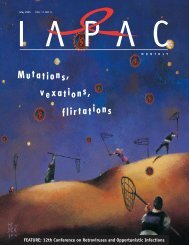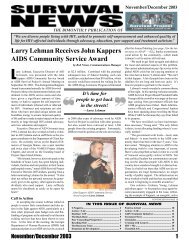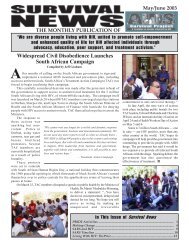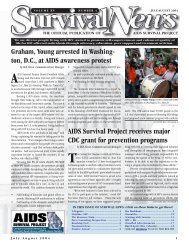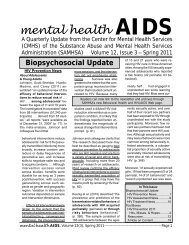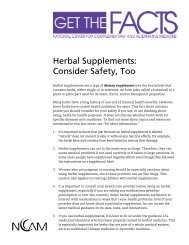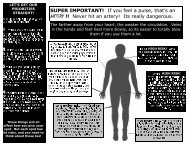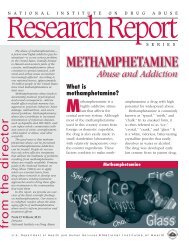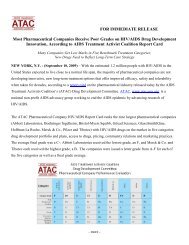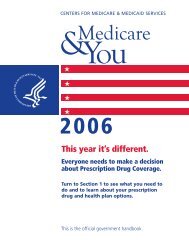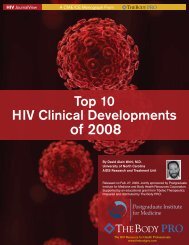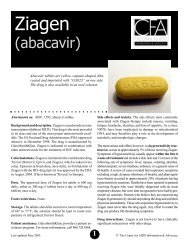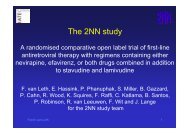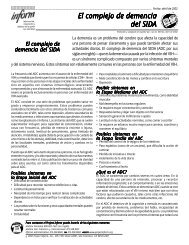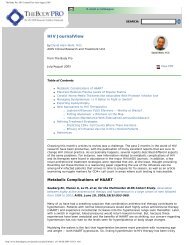WELLNESS STARTS WITH AWARENESS - CD8 T cells - The Body
WELLNESS STARTS WITH AWARENESS - CD8 T cells - The Body
WELLNESS STARTS WITH AWARENESS - CD8 T cells - The Body
You also want an ePaper? Increase the reach of your titles
YUMPU automatically turns print PDFs into web optimized ePapers that Google loves.
Photo © Russell McGonagle<br />
Life Savers<br />
On the front lines at the FDA<br />
by Matt Sharp<br />
I<br />
was recently honored to retell the history of AIDS activism for<br />
a workshop at the Food and Drug Administration in Rockville,<br />
Maryland. I spoke on a patient representative panel about how<br />
AIDS activists “got in the door” at the FDA, eventually speeding up<br />
HIV drug approval and changing the way drugs become approved<br />
for all diseases. I was on that AIDS battlefront, and I am an FDA<br />
patient representative myself, having sat on the Antiviral and Blood<br />
Product advisory committees—which meet to discuss data on the<br />
latest developments, so my perspective was useful in telling the<br />
story of AIDS activism and the FDA.<br />
It was a most inspiring workshop that reinvigorated my desire,<br />
passion, and commitment for the work I’ve been doing for almost 20<br />
years. Patient advocates representing people living with Alzheimer’s,<br />
breast cancer, lymphoma, Parkinson’s, and many other diseases<br />
attended this 9th FDA Patient Representative Workshop. (Th e<br />
word “patient” signifi es passivity and is troublesome for me; more<br />
on that later.) Some of the reps were survivors, many living for 10<br />
or more years with their disease. Others were parents, brothers or<br />
sisters, husbands or wives of people either still alive or deceased.<br />
I was so moved by the compassion and energy of these advocates.<br />
Th ey were hungry for information about how activists became<br />
so successful in turning around the course of AIDS. Th ey wanted<br />
to know how they did it—how we got to the place we are today and<br />
what our strategies were. Th ey wanted to<br />
know how we dealt with an apathetic gov-<br />
ernment and how we mobilized our community.<br />
I was eager to share the information<br />
and to tell the compelling story of how<br />
far we had come in such a short time with<br />
such a complex disease in such an apathetic<br />
world.<br />
Th e advocates were diverse, but the<br />
majority were women. <strong>The</strong>re were new<br />
advocates and more seasoned ones. Some<br />
had represented their communities on FDA advisory panels for<br />
new drugs, others were meeting each other for the fi rst time. Th e<br />
breast cancer survivors were the most outspoken and were very<br />
knowledgeable. Two members spoke about their own issues with<br />
clinical trial outcomes and surrogate markers, which brought up<br />
memories of similar debates we had in HIV with the use of changes<br />
in CD4 counts to show whether a drug worked or not. Th e interaction<br />
reminded me of ACT UP Golden Gate meetings in the ’90s in<br />
San Francisco where we reserved space for breast cancer activists<br />
on our weekly meeting agendas. We helped to mentor them, we<br />
helped plan and coordinate their demonstrations, and we helped<br />
educate them on the science. Th ere we were, a ramshackle group of<br />
biker-jacketed and Doc Martin boot-wearing gay men and lesbians<br />
mentoring housewives from the suburbs. A very bright torch was<br />
PA • September / October 2008 • tpan.com • positivelyaware.com<br />
Positively Aware<br />
Get Sharp<br />
passed in those days to other passionate and desperate advocates<br />
who were simply fi ghting for their lives. It was beautiful seeing<br />
some of the fruits of our mentoring with the breast cancer advocates<br />
at this FDA meeting.<br />
All through the day I was approached with detailed questions<br />
about AIDS history—how we strategized and mobilized. A sickle<br />
cell anemia advocate asked me how to get a new group of sickle<br />
cell advocates to focus on the issues of their disease—a question I<br />
still hear in the HIV community. Th e patient representatives were<br />
anything but “patient,” but a real force, sponges soaking up the<br />
information, desperate to learn in order to embolden their fellow<br />
survivors. At the same time there was an overwhelming respect for<br />
each other, for human dignity and survival. Th ese were the new<br />
AIDS activists, survivors acting on their own behalf, for their own<br />
situations and their own lives.<br />
Suddenly I felt like more of a veteran than ever before with<br />
a whole new crop of advocates for other diseases. Th ere was an<br />
unspoken understanding among all of us regarding the battles we<br />
face and the challenges we have just to survive. It was a camaraderie<br />
that I haven’t seen before and the power in the room was clear. How<br />
can people who are not suff ering from life-threatening conditions<br />
hold so much power and control over those who are fi ghting for<br />
their lives?<br />
Suddenly I felt like more of a<br />
veteran than ever before with<br />
a whole new crop of advocates<br />
for other diseases.<br />
But all in all, the message was clear to me over the course of<br />
a few days. Th is gathering of a group of empowered “patients” was<br />
not about how eff ective empowered people could be to change the<br />
drug development process, but was more about the collective power<br />
of human bonding to end human suff ering.<br />
Vito Russo, a long-time AIDS activist and ACT UP member<br />
said in 1988, “Remember that one day the AIDS crisis will be over.<br />
And when that day has come and gone there will be people alive<br />
who will know that there was once a terrible disease, and that a<br />
brave group of people stood up and fought and in some cases died<br />
so that others might live and be free.” Substitute other conditions<br />
for AIDS in Vito’s quote and you can attribute the same sentiment<br />
to all patient advocates, who are trying to make a diff erence for the<br />
sake of their own lives and survival. e<br />
19



